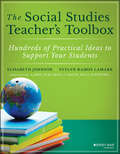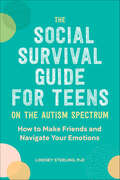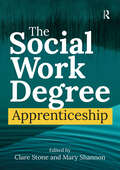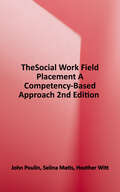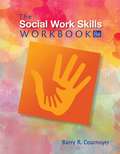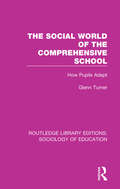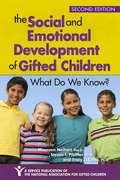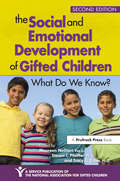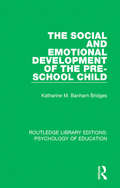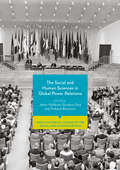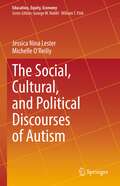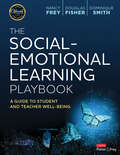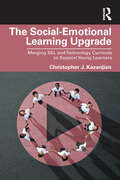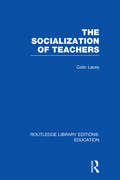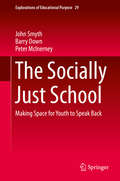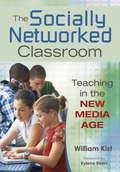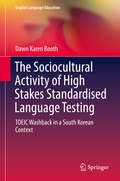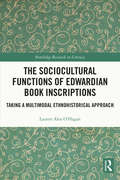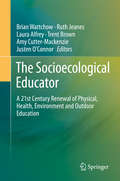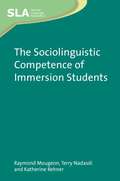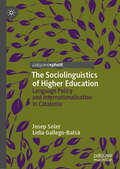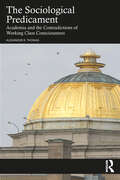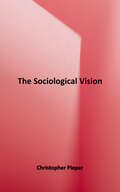- Table View
- List View
The Social Studies Teacher's Toolbox: Hundreds of Practical Ideas to Support Your Students (The Teacher's Toolbox Series)
by Elisabeth Johnson Evelyn RamosSocial studies teachers will find classroom-tested lessons and strategies that can be easily implemented in the classroom The Teacher’s Toolbox series is an innovative, research-based resource providing teachers with instructional strategies for students of all levels and abilities. Each book in the collection focuses on a specific content area. Clear, concise guidance enables teachers to quickly integrate low-prep, high-value lessons and strategies in their middle school and high school classrooms. Every strategy follows a practical, how-to format established by the series editors. The Social Studies Teacher's Toolbox contains hundreds of student-friendly classroom lessons and teaching strategies. Clear and concise chapters, fully aligned to Common Core Social Studies standards and National Council for the Social Studies standards, cover the underlying research, technology based options, practical classroom use, and modification of each high-value lesson and strategy. This book employs a hands-on approach to help educators quickly learn and apply proven methods and techniques in their social studies courses. Topics range from reading and writing in social studies and tools for analysis, to conducting formative and summative assessments, differentiating instruction, motivating students, incorporating social and emotional learning and culturally responsive teaching. Easy-to-read content shows how and why social studies should be taught and how to make connections across history, geography, political science, and beyond. Designed to reduce instructor preparation time and increase relevance, student engagement, and comprehension, this book: Explains the usefulness, application, and potential drawbacks of each instructional strategy Provides fresh activities applicable to all classrooms Helps social studies teachers work with ELLs, advanced students, and students with learning differences Offers real-world guidance for addressing current events while covering standards and working with textbooks The Social Studies Teacher's Toolbox is an invaluable source of real-world lessons, strategies, and techniques for general education teachers and social studies specialists, as well as resource specialists/special education teachers, elementary and secondary educators, and teacher educators.
The Social Survival Guide for Teens on the Autism Spectrum: How to Make Friends and Navigate Your Emotions
by Lindsey SterlingConnect with friends and care for your emotions—for teens on the spectrumSocial situations can feel mysterious or tricky to navigate—and if you are on the autism spectrum, they can feel overwhelming. The Social Survival Guide for Teens on the Autism Spectrum unlocks socialization secrets and helps you understand your feelings. Autism books for kids don't always address teenagers' needs, but the practical tips and step-by-step guides in this handbook are perfect for ages 12-16.Learn how to handle situations like managing anxiety, starting a conversation, understanding sarcasm, and dealing with conflict. Build stronger social skills and take care of your emotional health at the same time. This guide can help you feel more confident—and more connected to people you care about.Build new social interaction skills with:Friend fundamentals—Understand what makes a good friend, and learn about informal conversation, nonverbal communication, online etiquette, and more.Social essentials—Discover strategies for joining a group activity, staying flexible, saying no when you need to, and other topics essential to autism books for kids.Insight into you—You are your friend, too! Learn to recognize and express emotions, boost your mood with positive self-talk, and more.Feel more confident and build valued friendships with this helpful handbook.
The Social Work Degree Apprenticeship
by Clare Stone Mary ShannonDeveloped specifically for the social work degree apprenticeship, this book guides apprentices through the unique requirements of this new qualifying route. With contributions from academics, employers and students, it provides a broad and inclusive perspective to build effective working relationships. The social work degree apprenticeship is unlike any other qualifying route to become a professional social worker. Apprentices have to juggling a number of competing demands, balancing their work and learning commitments, the expectations of their employer and those of their university. It can be intense, high-paced and stressful, and very often apprentices are mature students who may not have been in formal learning environment for many years. This book has been written specifically with apprentices in mind and by a range of stakeholders, not just academics, who draw upon their experience and expertise to help apprentices successfully navigate this qualification.Key theoretical concepts are introduced throughout, practical advice given and learning features encourage reflection and application, making this a go-to textbook, whether it’s your first time taking a degree or you’re a mature student returning to study - this is an essential companion to your learning journey, helping you manage your relationship with your university and employer.
The Social Work Experience: A Case-Based Introduction to Social Work and Social Welfare
by Carolyn Wells Mary SuppesThe Social Work Experience: An Introduction to Social Work and Social Welfare introduces students to the social work profession and presents detailed descriptions of eight major fields of practice. The text provides in-depth information concerning major social welfare policies that are are presented in historical perspective, along with thorough discussion of current issues and probable future trends. Major case studies assist students in understanding how professional expertise can advance social-work practice and how enlightened social policies must be present if professional interventions are to be effective.
The Social Work Field Placement: A Competency-Based Approach
by John E. Poulin Selina Matis Heather WittThis book is designed to help BSW and MSW students enrolled in foundation field placements and field seminars structure their field placement learning around the nine Council on Social Work Education (CSWE) profession social work competencies defined in the 2022 Educational Policy and Accreditation Standards (EPAS). Our goal is to ensure that foundation field placement students integrate course learning related to social work competencies with their field placement learning experiences in a purposeful, reflective, and integrated manner. It focuses the field experience and learning opportunities on social work competencies. Each chapter is directly linked to a professional competency with substantive content on the competency, field reflection questions, critical thinking questions, a detailed case example illustrating one or more competencies with discussion questions, and electronic competency resource links to websites and videos.
The Social Work Skills Workbook
by Barry R. CournoyerTHE SOCIAL WORK SKILLS WORKBOOK, Eighth Edition, enables you to develop proficiency in professionalism and the essential social work skills. After introducing 10 dimensions of professionalism, the book offers multiple opportunities to rehearse, practice, and self-assess social work skills needed in a contemporary practice -- helping you become a more confident, ethical, and effective helper. Each social work skill supports one or more of the 43 knowledge and value statements and the 31 practice behaviors that elaborate core competencies in the 2015 Educational Policy and Accreditation Standards (EPAS) of the Council on Social Work Education (CSWE). The skills also align with nationally standardized licensing exams. The text includes explanations grounded in contemporary research, assessment tools and processes, and experiential components that help you get a realistic sense of the field. Case examples and skill-building exercises cultivate your professionalism and expertise.
The Social World of the Comprehensive School: How Pupils Adapt (Routledge Library Editions: Sociology Of Education Ser. #56)
by Glenn TurnerA comprehensive school, like any community, is split into many groups and sub-divisions and contains many different ‘social worlds’ within its structure. First published in 1983, this work is based on a one-year project carried out by the author which involved observation of pupils in lessons and interviews and informal conversa
The Social and Emotional Development of Gifted Children
by Maureen Neihart Tracy Cross Steven PfeifferThe Social and Emotional Development of Gifted Children remains the only book that provides a comprehensive summary of the empirical research on the social and emotional development of gifted children by leading authorities in the field. It includes several features that make it the leading text on what we know about the social and emotional development of gifted children. For example, it summarizes the most significant findings from the empirical research on the topic. It also includes noteworthy variations that have been observed across cultural groups or global contexts. Each chapter also provides a short description of the practical applications that can be made from the research. This second edition includes an entirely new section on the psychosocial aspects of talent development, as well as addresses the burgeoning interest and research base regarding gifted performance. The text also includes several new topics that have emerged from the research in the past decade, such as the neuroscience of talent development and motivation for talent development. This book is a service publication of the National Association for Gifted Children.
The Social and Emotional Development of Gifted Children: What Do We Know?
by Maureen NeihartThe Social and Emotional Development of Gifted Children remains the only book that provides a comprehensive summary of the empirical research on the social and emotional development of gifted children by leading authorities in the field. It includes several features that make it the leading text on what we know about the social and emotional development of gifted children. For example, it summarizes the most significant findings from the empirical research on the topic. It also includes noteworthy variations that have been observed across cultural groups or global contexts. Each chapter also provides a short description of the practical applications that can be made from the research. This second edition includes an entirely new section on the psychosocial aspects of talent development, as well as addresses the burgeoning interest and research base regarding gifted performance. The text also includes several new topics that have emerged from the research in the past decade, such as the neuroscience of talent development and motivation for talent development. This book is a service publication of the National Association for Gifted Children.
The Social and Emotional Development of the Pre-School Child (Routledge Library Editions: Psychology of Education)
by Katharine M. Banham BridgesOriginally published in 1931, the study reported in this book was undertaken as part of the research programme of the Canadian National Committee for Mental Hygiene. It represents a systematic inquiry into the social and emotional behaviour of pre-school children as observed from day to day in a nursery school. The study extended over a period of three years, and it concerned children between the ages of two and five years who were in attendance at the McGill University Nursery School and child laboratory. It can now be read and enjoyed in its historical context.
The Social and Human Sciences in Global Power Relations (Socio-historical Studies Of The Social And Human Sciences Ser.)
by Johan Heilbron Gustavo Sorá Thibaud BoncourtThis volume employs new empirical data to examine the internationalization of the social sciences and humanities (SSH). While the globalization dynamics that have transformed the shape of the world over the last decades has been the subject of a growing number of scientific studies, very few such studies have set out to analyze the globalization of social and human sciences themselves. Arguing against the complacent assumption that Science is ‘international by nature’, this work demonstrates that the growing circulation of scholars and scientific ideas is a complex, contradictory and contested process. Arranged thematically, the chapters in this volume present a coherent exploration of patterns of transnationalization, South-North and East-West exchanges, and transnational regionalization. Further, they offer fresh insight into specific topics including the influence of the Anglo-American research infrastructure and the development of social and human sciences in postcolonial contexts. Featuring contributions from leading international scholars in the field, this work will advance the research agenda and will have interdisciplinary appeal for scholars from across the social sciences.
The Social, Cultural, and Political Discourses of Autism (Education, Equity, Economy #9)
by Michelle O'Reilly Jessica Nina LesterTaking up a social constructionist position, this book illustrates the social and cultural construction of autism as made visible in everyday, educational, institutional and historical discourses, alongside a careful consideration of the bodily and material realities of embodied differences. The authors highlight the economic consequences of a disabling culture, and explore how autism fits within broader arguments related to normality, abnormality and stigma. To do this, they provide a theoretically and historically grounded discussion of autism—one designed to layer and complicate the discussions that surround autism and disability in schools, health clinics, and society writ large. In addition, they locate this discussion across two contexts – the US and the UK – and draw upon empirical examples to illustrate the key points. Located at the intersection of critical disability studies and discourse studies, the book offers a critical reframing of autism and childhood mental health disorders more generally.
The Social-Emotional Learning Playbook: A Guide to Student and Teacher Well-Being
by Douglas Fisher Nancy Frey Dominique SmithTeach skills and foster the dispositions of social and emotional learning in yourself, your students, and your school. Social and emotional learning (SEL) is like any academic subject students learn in school—their learning expands and deepens, year after year. As an educator, what can you do to support not only your students’ well-being and SEL development, but your own? The Social-Emotional Learning Playbook: A Guide to Student and Teacher Well-Being provides the language, moves, and evidence-based advice you need to identify and nurture social and emotional learning in yourself, your students, and your school. Sparking deep reflection and transformative growth, this highly interactive playbook profiles six tenets of social and emotional learning—building resilience, belonging and prosocial skills, emotional regulation, relational trust and communication, individual and collective efficacy, and community of care. Each module features Reflection prompts and self-awareness resources that help teachers identify strengths, target areas for growth, and engage with colleagues over social and emotional development. Strategies for teaching and reinforcing SEL skills that are proven through effect size to increase your impact on students, both academically and socially. Ideas for creating a school culture that manifests social and emotional learning in policies, procedures, and interactions with families and the community. Vocabulary self-assessments, word clouds, and a "Case in point" feature that allows you to analyze a situation, cognitively reframe it, and decide a course of action. With this actionable playbook in hand, jumpstart your social and emotional development journey, reduce compassion fatigue, and create alliances and opportunities for the children and adults in your school community to thrive.
The Social-Emotional Learning Playbook: A Guide to Student and Teacher Well-Being
by Douglas Fisher Nancy Frey Dominique SmithTeach skills and foster the dispositions of social and emotional learning in yourself, your students, and your school. Social and emotional learning (SEL) is like any academic subject students learn in school—their learning expands and deepens, year after year. As an educator, what can you do to support not only your students’ well-being and SEL development, but your own? The Social-Emotional Learning Playbook: A Guide to Student and Teacher Well-Being provides the language, moves, and evidence-based advice you need to identify and nurture social and emotional learning in yourself, your students, and your school. Sparking deep reflection and transformative growth, this highly interactive playbook profiles six tenets of social and emotional learning—building resilience, belonging and prosocial skills, emotional regulation, relational trust and communication, individual and collective efficacy, and community of care. Each module features Reflection prompts and self-awareness resources that help teachers identify strengths, target areas for growth, and engage with colleagues over social and emotional development. Strategies for teaching and reinforcing SEL skills that are proven through effect size to increase your impact on students, both academically and socially. Ideas for creating a school culture that manifests social and emotional learning in policies, procedures, and interactions with families and the community. Vocabulary self-assessments, word clouds, and a "Case in point" feature that allows you to analyze a situation, cognitively reframe it, and decide a course of action. With this actionable playbook in hand, jumpstart your social and emotional development journey, reduce compassion fatigue, and create alliances and opportunities for the children and adults in your school community to thrive.
The Social-Emotional Learning Upgrade: Merging SEL and Technology Curricula to Support Young Learners
by Christopher J. KazanjianThe Social-Emotional Learning Upgrade explores how today’s educators can connect two previously separated but important curricula in their schools: social-emotional learning (SEL) and educational technology. With schools’ SEL efforts pressed for time and resources and digital engagements often limited to skill development, K-12 students risk being unprepared to sustain their well-being and personal opportunities in a rapidly changing, technology-dependent world. Driven by a paradigm that synthesizes multicultural education and humanistic psychology, this book readies educators to implement SEL curricula that will support young learners as they navigate constant social and technological flux and that will nurture their unique perceptions of reality, their aspirations, and their mental and physical health. Each chapter’s novel insights will help to mitigate both student disengagement and teacher demoralization, enabling classroom pedagogies and the process of schooling to better align with the ways in which learners explore, express, and create meaning. Guiding pre-service teachers, leaders, and curriculum developers beyond common goals such as digital skills development, content mastery, or standardized testing, this volume focuses instead on complex digital literacies, collaborative experiences, problem- and project-based learning, culturally relevant pedagogies, and overall holistic growth.
The Socialization of Teachers (Routledge Library Editions: Education)
by Colin LaceyThe change from a student role to a teacher role can be one of the most abrupt and stressful transitions in working life but the process of socialization does not end when the student becomes a fully qualified teacher, as many writers, laymen and sociologists, would have us believe. Colin Lacey argues that socialization is a partial and rarely homogenous process. He illustrates this from a wide variety of interesting case material to show how student teachers adapt their responses to the classroom situation.
The Socially Just School
by John Smyth Barry Down Peter McinerneyThis book explores schools and how they can function as social institutions that advance the interests and life chances of all young people, especially those who are already the most marginalized and at an educational disadvantage. Social justice is a key theme as the book examines the needs of youth, the concept of school culture, school/community relations, socially critical pedagogy, curriculum and leadership and a socially critical approach to work. The Socially Just School is based upon four decades of intensive writing and researching of young lives. This work presents an alternative to the damaging school reform in which schools are made to serve the interests of the economy, education systems, the military, corporate or national interests. Readers will discover the hallmarks of socially just schools: - They educationally engage young people regardless of class, race, family or neighbourhood location and they engage them around their own educational aspirations. - They regard all young people as being morally entitled to a rewarding and satisfying experience of school, not only those whose backgrounds happen to fit with the values of schools. - They treat young people as having strengths and being 'at promise' rather than being 'at risk' and with 'deficits' or as 'bundles of pathologies' to be remedied or 'fixed'. - They are 'active listeners' to the lives and cultures of their students and communities and they construct learning experiences that are embedded in young lives. This highly readable book will appeal to students and scholars in education and sociology, as well as to teachers and school administrators with an interest in social justice.
The Socially Networked Classroom: Teaching in the New Media Age
by William R. KistIncorporate social networking into instruction, no matter your level of technological expertise or Internet access! With appropriate guidance, students’ social networking skills can be harnessed for teaching and learning in the 21st century. William Kist demonstrates how pioneering teachers have successfully integrated screen-based literacies into instruction and provides: Real-world activities and lesson examples for Grades 5–12, with assignment sheets, assessments, and rubrics Ideas on fostering collaborative learning using blogs, wikis, nings, and other interactive media. Tips on Internet safety, blogging etiquette, protected blogging sites, and more Blog entries from classroom teachers
The Sociocultural Activity of High Stakes Standardised Language Testing: Toeic Washback In A South Korean Context (English Language Education #12)
by Dawn Karen BoothThis book explores the influence of high stakes standardised testing within the context of South Korea. South Korea is regarded as a shining example of success in educational achievement and, as this book reveals, pressurised standardised testing has been a major contributing factor to its success. This unique country provides an excellent setting from which to explore the powerful relationship that exists between testing and learning and can advance our understanding of which factors and test conditions will positively and negatively influence learning. This book follows the test activity of a group of Korean university students preparing for the TOEIC (Test of English for International Communication) and posits a revised model of the influence of testing on learning. It calls for a more socially situated view of tests and test-takers considered in relation to the sociocultural, historical, political and economic contexts in which they are embedded.
The Sociocultural Functions of Edwardian Book Inscriptions: Taking a Multimodal Ethnohistorical Approach (Routledge Research in Literacy)
by Lauren Alex O'HaganThis innovative text draws on theories and methodologies from the fields of multimodality, ethnography, and literacy studies to explore the sociocultural significance of book ownership and book inscriptions in Edwardian Britain. The Sociocultural Functions of Edwardian Book Inscriptions examines evidence gathered from historical records, archival documents, and the inscriptive practices of individuals from the Edwardian era to foreground the social, communicative, and performative functions of inscriptive practices and illustrate how material, lexical, and semiotic means were used to perform identity, contest social status, and forge relationships with others. The text adopts a unique ethnohistorical approach to multimodality, supporting the development of a typography of book inscriptions which will serve as a unique interpretive framework for analysis of literary artefacts in the context of broader sociopolitical forces. This text will benefit doctoral students, researchers, and academics in the fields of Literacy Studies, English language arts, and research methods in education more broadly. Those interested in British book history, anthropology, and 20th-century literature will also enjoy this volume.
The Socioecological Educator: A 21st Century Renewal of Physical, Health,Environment and Outdoor Education
by Amy Cutter-Mackenzie Justen O'Connor Ruth Jeanes Trent Brown Laura Alfrey Brian WattchowThis volume offers an alternative vision for education and has been written for those who are passionate about teaching and learning, in schools, universities and in the community, and providing people with the values, knowledge and skills needed to face complex social and environmental challenges. Working across boundaries the socio-ecological educator is a visionary who strives to build community connections and strengthen relationships with the natural world. The ideas and real-world case studies presented in this book will bring that vision a step closer to reality.
The Sociolinguistic Competence of Immersion Students
by Terry Nadasdi Raymond MougeonThis book reports the findings of an extensive research project on the acquisition of the native norms of spoken French variation by French immersion students who have learnt their second language primarily in an educational context. The project focused on a range of phonetic, lexical and grammatical sociolinguistic variants documented in studies of contemporary first language varieties of spoken French, and assessed the extent to which the students master the linguistic and extra-linguistic factors which govern variant choice. The book also discusses pedagogical strategies to improve the students' mastery of spoken French variation. The book represents an important contribution to an under-researched aspect of advanced Second Language Acquisition in an institutional setting.
The Sociolinguistics of Higher Education: Language Policy and Internationalisation in Catalonia
by Josep Soler Lídia Gallego-BalsàThis book investigates the sociolinguistic dimension of the internationalisation of higher education, examining the linguistic tensions and ambiguities experienced by universities around the world, particularly in non-anglophone contexts. Joining current debates within discursive and ethnographic approaches to language policy, the authors analyse the narrative emerging from university language policy documents, and then trace the stance-taking processes of different stakeholders at a small university in Catalonia. They pay particular attention to how teachers, administrative staff, and exchange students position themselves in connection to the role of Catalan and its coexistence with other languages at the university. This book will be of interest to language policy scholars and practitioners, as well as graduate students in sociolinguistics and applied linguistics
The Sociological Predicament: Academia and the Contradictions of Working Class Consciousness
by Alexander ThomasA sociological phenomenon afflicts sociology itself: academics think of themselves as the vanguard of the working class despite the fact that they are not working class, as the noble willingness to side with the oppressed contrasts scholars’ reliance on authority to bolster their politics.While there are no simple solutions to this contradiction, a necessary beginning is for sociologists (and other academics) to acknowledge the reality of their own class privilege as members of the professional-managerial class. The Sociological Predicament is then a conscious and deliberate work of professional self-loathing that traces the evolution of ideologies found in academia from the mid-twentieth century to today, which demonstrates the ways in which biases around class have given short shrift to the concerns of working class Americans in deindustrialized cities and towns that have ultimately turned away from and then against them.Intellectuals have not historically been on the side of the oppressed but have been instrumental in developing ideologies that sustain the status quo, and this book crucially asks whether academics’ presence on the left ultimately serves conservative ends.
The Sociological Vision
by Christopher PieperNew Edition Now Available! What is sociology? Will I like it? Does it matter in the world? Can it help me? The Sociological Vision is designed to answer these questions and cultivate a new way of seeing social life. Geared primarily toward students beginning a journey into the social sciences, or for those with general curiosity for the subject, The Sociological Vision offers a glimpse into the fascinating, revelatory, and occasionally fun world of sociology. Consider it a " sampler platter" for studying human societies and cultures. The book uses a historical approach, a comparative glance, and a critical eye. It shows students how to hone the skills we all have as "armchair" sociologists in observing, describing, explaining, and evaluating the social world in more systematic ways. It encourages readers to ask tough questions about society and themselves. The book emphasizes the individual's role as both participant in society and a recipient of societal influences. Finally, it focuses on how we each build the social order and considers the larger impacts of these small actions.
